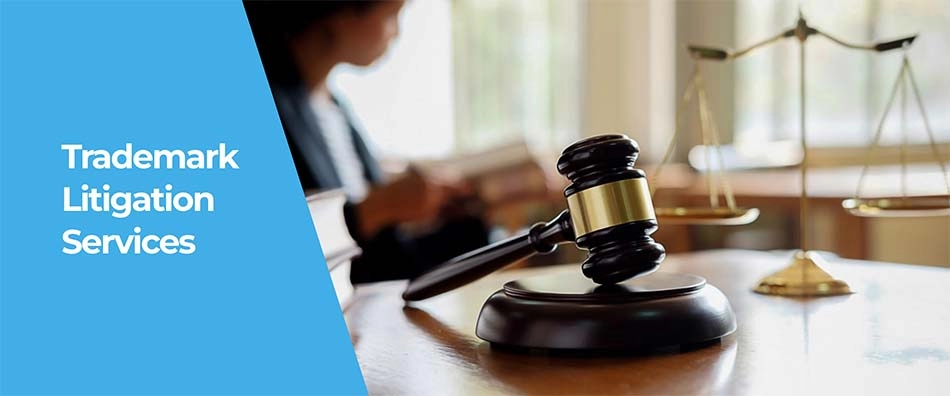
What is Trademark Litigation?
Trademark Litigation refers to legal proceedings that involve the enforcement or defense of a trademark or its associated rights. It is the process of resolving disputes where a trademark owner seeks to protect their intellectual property from infringement or misappropriation. This type of litigation typically involves cases where a party is using a trademark that is identical or confusingly similar to an existing registered trademark, potentially causing harm to the trademark owner’s brand, reputation, or sales. Trademark litigation ensures that the integrity of intellectual property is maintained and its commercial value is protected.
Types of Trademark Litigation
Infringement Cases: This is the most common type of trademark litigation. It occurs when a third party uses a trademark that is identical or similar to a registered trademark, leading to confusion among consumers. The owner of the registered trademark files a lawsuit seeking to stop the infringing activity.
Passing Off: Passing off occurs when one business tries to deceive consumers by using a trademark or branding that is similar to another established trademark, even if that trademark is not registered. The victim can file a lawsuit for passing off under common law.
Cancellation Proceedings: This type of litigation occurs when a party challenges the validity of an existing trademark registration, usually on the grounds that the trademark was obtained fraudulently, is not distinctive, or has become generic.
Opposition Proceedings: Trademark opposition is filed when a party opposes the registration of a new trademark that is too similar to its existing trademark. The opposing party seeks to prevent the new trademark from being registered by proving the likelihood of confusion among consumers.
Significance of Trademark Litigation
Protection of Intellectual Property:
Trademark litigation is crucial for defending the intellectual property rights of businesses and preventing others from using their brand name or logo without permission. It helps preserve the distinctiveness and goodwill of a trademark.
Brand Reputation & Consumer Trust:
Resolving trademark disputes ensures that consumers are not misled or confused by counterfeit or deceptive trademarks, maintaining the reputation and trust associated with the brand.
Preventing Financial Losses:
Trademark infringement can lead to significant financial losses due to brand dilution, loss of sales, and consumer confusion. Litigation can prevent such losses by stopping infringing activities.
Encourages Fair Competition:
Trademark litigation helps maintain fair competition in the marketplace by ensuring that businesses are not unlawfully benefiting from another's brand identity, promoting an environment where original ideas thrive.
Documents Required for Trademark Litigation
When pursuing trademark litigation, the following documents are generally required:
Trademark Registration Certificate:
A copy of the trademark registration certificate, which proves ownership and the legal right to the trademark.
Infringement Evidence:
Documents and evidence proving that the infringing party is using a trademark that is identical or similar to your own. This could include advertisements, packaging, product labels, and online listings.
Cease and Desist Letters:
Copies of any cease and desist letters sent to the infringing party, demanding they stop using the trademark.
Proof of Use:
Evidence showing how the trademark has been used in commerce, such as sales records, marketing materials, and other relevant documentation.
Legal Notice:
A copy of any legal notice that has been served to the infringing party.
Court Documents:
If the litigation is already ongoing, relevant court documents, such as the petition or filing, may also be needed.
Process of Trademark Litigation
Trademark Search & Evidence Collection:
The first step is to perform a comprehensive trademark search to verify whether the alleged infringing trademark is indeed identical or similar to your registered trademark. Gathering evidence of the infringement is also critical.
Cease and Desist Letter:
Before taking legal action, a cease and desist letter is typically sent to the infringing party, demanding that they stop using the conflicting trademark. This serves as an initial attempt to resolve the issue without litigation.
Filing a Lawsuit:
If the infringing party does not comply with the cease and desist letter, the next step is to file a lawsuit in the appropriate court. In India, trademark cases are typically handled by the Intellectual Property Appellate Board (IPAB) or the district courts.
Discovery Phase:
During this phase, both parties exchange evidence and documents related to the case. This is essential for the legal team to build their case and for the opposing party to respond to allegations.
Court Hearing:
The court will schedule hearings to discuss the merits of the case. Both parties present their evidence, and the court determines whether the trademark infringement has occurred.
Judgment & Enforcement:
After reviewing all evidence and arguments, the court will issue a judgment. If the plaintiff wins the case, the infringing party may be ordered to cease using the trademark, pay damages, or take corrective actions to avoid further harm.
Eligibility for Trademark Litigation
To initiate trademark litigation, the following conditions must be met:
Ownership of a Registered Trademark:
You must be the owner of a registered trademark, which provides the legal standing to file a lawsuit for infringement.
Infringement or Passing Off:
There must be evidence that your trademark is being infringed upon or that someone is passing off their goods or services as your own.
Commercial Use of the Trademark:
The trademark must have been used in commerce, and you must demonstrate how it has been used to establish its reputation and goodwill in the market.
Timely Action:
Trademark litigation must be initiated within the statutory period after the infringement has occurred. Delaying the lawsuit could result in losing the right to claim damages.
Cost of Trademark Litigation
The cost of trademark litigation can vary based on several factors:
Attorney Fees:
Legal fees for trademark litigation depend on the complexity of the case and the experience of the attorney. Fees may be charged hourly or on a retainer basis.
Court Fees:
There are court filing fees associated with trademark litigation, which vary depending on the jurisdiction and the type of case.
Damages and Compensation:
If the court finds in favor of the trademark owner, the infringing party may be ordered to pay damages, including statutory damages, actual damages, and profits gained from the infringement.
Additional Expenses:
Other costs may include administrative charges, translation fees (if necessary), and expenses related to gathering evidence or expert testimony.
How to Check Trademark Litigation Status?
To check the status of your trademark litigation:
Visit the Official Court Website:
Visit the official website of the court handling the trademark case, such as the IPAB or the relevant district court.
Enter Case Details:
Input the case number, party name, or other relevant details into the search function.
Track the Status:
You will be able to track the current status of the case, including hearing dates, orders, and judgment details.
Why Choose My Startup Solution for Trademark Litigation?
Experienced Legal Team:
Our legal team specializes in trademark litigation and has extensive experience in handling complex trademark disputes across various industries.
Comprehensive Services:
We provide end-to-end services, from trademark registration to enforcement and litigation, ensuring complete protection for your intellectual property.
Strategic Approach:
We use a strategic approach to resolve trademark disputes efficiently, minimizing costs and time while ensuring a favorable outcome for your business.
Tailored Solutions:
We understand that each trademark dispute is unique, and we provide customized legal strategies based on your specific needs and objectives.
Quick Resolution:
Our focus is on delivering fast and effective results, helping you protect your brand and maintain your competitive edge in the marketplace.
Why is Trademark Litigation Important?
Protects Brand Identity:
Trademark litigation helps safeguard your brand's identity and ensures that no one can unfairly capitalize on your hard-earned reputation.
Prevents Financial Losses:
Trademark disputes, if left unresolved, can lead to significant financial losses. Litigation helps prevent unauthorized use and protects your revenue streams.
Maintains Consumer Trust:
Ensuring that only authorized parties use your trademark helps maintain the trust of your customers, who rely on the authenticity and quality of your products and services.
Prevents Market Confusion:
Litigation ensures that consumers are not misled by counterfeit or confusingly similar trademarks, thereby preserving the clarity of your market position.
Trademark litigation can take anywhere from several months to a few years, depending on the complexity of the case and the court's workload.
Yes, trademark disputes can often be resolved through settlement, mediation, or arbitration before escalating to full litigation.
The cost varies based on several factors, including attorney fees, court fees, and the complexity of the case. It is best to discuss the details with a legal professional for a customized estimate.






